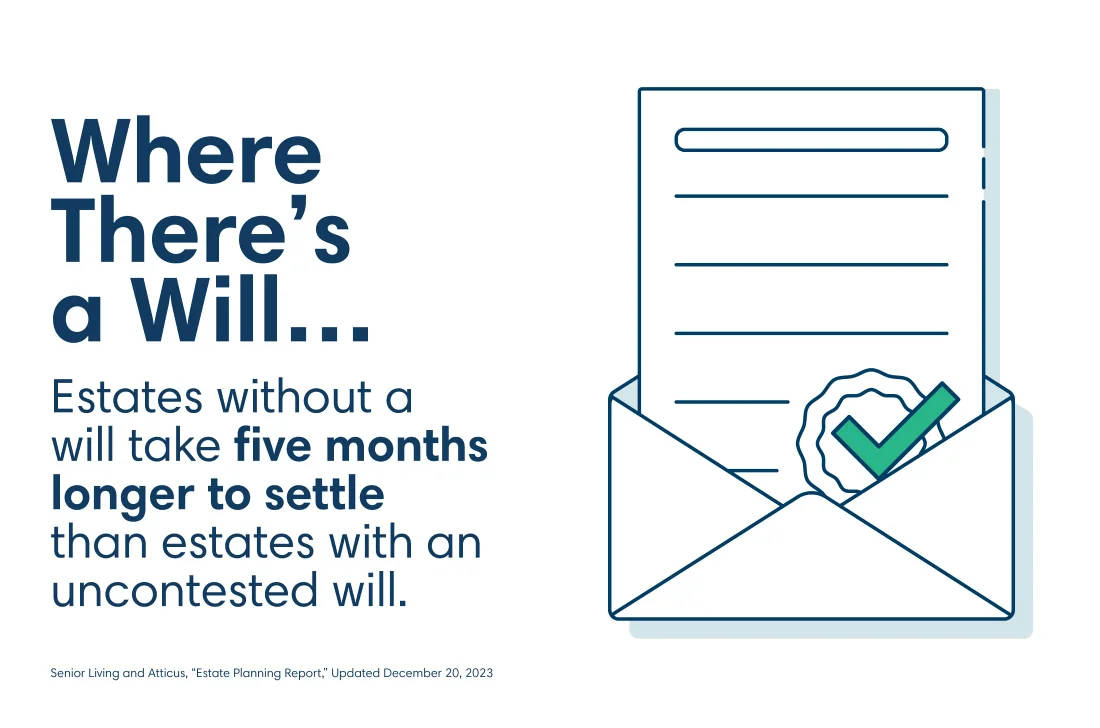Key considerations when you choose an executor
Naming an executor to oversee your last will and testament is one of the most important decisions you'll make when you create an estate plan. Still, most people have given little to no consideration to this selection process. In fact, Caring.com's 2022 estate planning survey revealed that 2/3 of American adults don't have a will at all.

These findings are alarming when you consider what's at stake. The Federal Reserve's 2022 Survey of Consumer Finances found that more than 20% of US households received an inheritance at some point during their lives. This percentage increases to almost 40% for those 70 and older.
What's more, findings from estate planning firm Atticus showed that estates without a will take 5 months longer to settle than estates with an uncontested will. Clearly, a will helps streamline estate planning by providing a plan to follow. However, it's the executor of the estate who follows through on the plan, and that's why choosing the right person is essential.
What does an executor of a will do?
An executor of a will does more than many people think. "The role of an executor—also referred to as a personal representative—is to step into the decedent's shoes once they're no longer able to carry out their plans or wishes," says Carrie Garrity, Director of Trust Services at First Citizens.
"The executor is tasked with following whatever legal documents are in place, such as the last will and testament," she explains. "And that person will distribute the assets to any beneficiaries named in the estate plan."
The process may seem straightforward, but the choice might not be as obvious as you think.
"I think there's often a misconception in families that the oldest child will automatically be the executor," Garrity says. "But that may not necessarily be a role the oldest child is equipped to do."
Garrity notes that other siblings, relatives or close associates outside the family might be better choices to serve as your executor. Another option is to select a third-party organization, such as a financial institution, to handle or co-handle the responsibilities.
"It's very time-consuming but also draining to serve as the executor of an estate, especially if you're close to the situation," Garrity says.
Given the many facets of the role, it's wise to consider several important factors when you select your executor.

Administration is job one
The person or institution you choose as your executor must accomplish many tasks—starting with going to probate court to be recognized as the party authorized to carry out the will's instructions. Other potential responsibilities include:
- Retaining legal and financial experts
- Filing final personal tax returns
- Locating and protecting property
- Making funeral arrangements
- Notifying beneficiaries
- Paying the decedent's final debts and expenses
- Conferring with family and associates who are familiar with the decedent's affairs
A great deal of paperwork and record-keeping also needs to be managed. First and foremost is an account of how the estate is managed and how the assets are dispersed.
"In most states, an executor must report to the probate court with an accounting that shows every single receipt that came into the estate and every single disbursement and bill paid," Garrity says. "The probate court can then question why you paid certain bills. They may even ask you to provide copies of the invoices. Also, any time you make a distribution to a beneficiary, the beneficiary must sign what's called a receipt-and-release that indicates that, yes, they received the asset."
Consider bringing in professional help
It's unlikely that any particular individual will have all the organizational skills and financial expertise necessary to handle the various tasks and responsibilities involved in executing a will. However, Garrity encourages careful consideration before naming more than one person to serve as executors.
"It can be problematic to name more than one individual because it can lead to a scenario where they disagree on how a particular matter gets handled," she says. "The document would need to be very clear as to who wins out in this scenario."
Picking more than one person could also lead to unnecessary complications. "In almost every transaction you do going forward, those individuals would have to sign all the paperwork including the court accountings. It can become more time-consuming and cause delays."
Instead of opening the floodgates for potential disagreements, bringing in outside help—such as a lawyer, accountant or financial institution—for assistance might be the better option. And while such professional support comes with a monetary cost, the estate can pay for any fees associated with those services.
"A co-executor relationship can work well in a scenario where a bank or other institution is named along with a family member," Garrity says. "That way, there's a family perspective, but there's also an organization that can referee or be the unbiased party."
Don't overlook soft skills
The ability to find solutions to resolve disputes is one of the secondary or soft skills an executor might need. Another might be the ability to act prudently during a difficult time when emotions are high.
"When you lose someone close to you, it's an emotional time," Garrity says. As a result, some individuals might not be thinking clearly or making the best long-term decisions.
"People may make rash decisions they regret later. Maybe they put the house on the market 10 days after their mom died and a year later, think, 'Oh, why did I do that?' So, you try to help people maneuver through that, have the conversations with them and task them to focus on getting through first things first," Garrity says. "Some of that is really about psychology and being a counselor during that period so people don't make a misstep they'll regret later."
Don't put off the process
Many of us don't like to think about death—especially our own—so it's not surprising that you might be tempted to procrastinate when it comes to creating a will or selecting an executor for your estate. But documenting how your affairs should be handled is important, and so is choosing the right individual or institution to execute those documents. Both will go a long way toward ensuring your intentions are followed.





